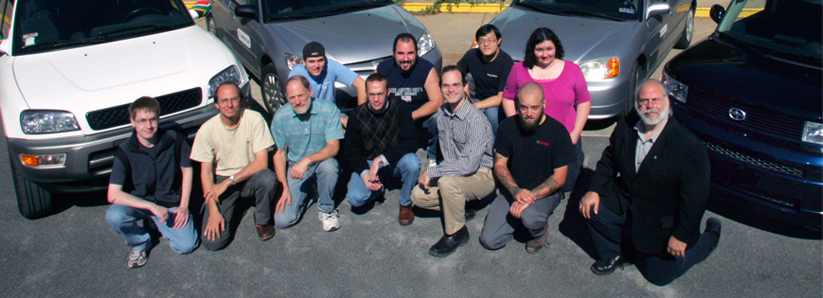About ChargeCar
ChargeCar is a new project at the CREATE Lab at the Carnegie Mellon University Robotics Institute. This project is funded thanks to the generosity of Donna Auguste (CMU alumna), David Hayes, The Heinz Endowments and Bombardier Inc.

Collaborators
We are grateful for the conversations and collaborations we have had with numerous electric vehicle groups, including:
- AllCell Technologies
- Carnegie Mellon Design Decisions Laboratory
- Carnegie Mellon Electric Industry Center
- HEVT
- Illinois Institute of Technology
- Whitacre Research Group
ChargeCar Team
- Illah Nourbakhsh (co-PI of ChargeCar; Director of CREATE)
- Gregg Podnar (co-PI of ChargeCar)
- Yoni Afek (Designer)
- Jeff Baker (Community Intern)
- Chris Bartley (Senior Research Programmer)
- Brett Boye (Local Artist)
- Ben Brown (Project Scientist; co-PI of ChargeCar)
- Jason Campbell (Intel Labs)
- Jenn Cross (Robotics PhD Student)
- Paul Dille (Research Programmer)
- Matt Duescher (Physics Intern)
- Asa Foster (Art Student)
- Alex May (Robotics Masters Student)
- Josh Schapiro (Research Engineer)
- Mike Schoenfeld (Mechanic at Baum Blvd Automotive)
- Alex Styler (Robotics PhD Student)
- Leland Thorpe (Robotics Masters Student)
- Rob Tisherman (Materials Science Student)
Readings
We have written two papers to provide you with more information about ChargeCar's analysis of the potential for change in the urban electric car ecology:
-
"Evaluating the Urban Electric Vehicle"
Learn more about the methods, motivations and mechanisms underlying the ChargeCar project.
-
"Modeling Your Electric Car"
Look under the hood of our physics model to see how we calculate your commute statistics.
Links
- 4EVRiders - A news and blog website on Electric and Plug-in Hybrid Vehicles.
- AutoblogGreen - A French/Italian car using supercapacitors.
- Building Greener Car - Science Friday with Ira Flatow (NPR).
- Electric Auto Association - Non-profit educational organization that promotes the advancement and widespread adoption of Electric Vehicles.
- EVcast - Podcast for information on electric cars.
- EVnut - Personal website of an EV enthusiast.
- EVTV.ME - Electric car conversion videos.
- EVWorld - Providing a human face to the topic of sustainable transportation.
- FuelClinic - Online tool showing it's not what, but how you drive.
- MIT News - MIT students develop regenerative shock absorbers.
- Plug-In-America - Updates on the status of electric vehicle production from major auto manufacturers around the world.
- Zoomlife - Interesting blog on the Electric Vehicle Industry.
ChargeCar's Guiding Principles:
|
Every Commute is Unique: |
Use Real Data:
We need solutions |
Engineer the Whole System: Many researchers and car companies are conducting outstanding research on specific components of electric cars, such as motors and batteries. We are doing complementary work by optimizing the entire power management system rather than concentrating on the individual component designs. This allows us to address the question: Can we use today's batteries, computers and supercapacitors to create far less costly intelligent electric vehicles? |
|
Include Everyone: ChargeCar is as much a social challenge as an engineering challenge. We want to involve you: collecting and sharing your commute data to contribute to accurate real-world commuting models to develop better intelligent control algorithms. |
Reuse: In addition to lowering the costs for commercially-developed electric vehicles, we are dedicated to practical conversion of existing cars, extending their usability. One of our goals is a conversion and customization process that empowers local mechanics and garages to be community-supported centers for an affordable urban electric vehicle revolution. |
Open the Hood: The combination supercapacitor-battery architecture has the potential for large gains in efficiency and large drops in overall cost of ownership. But to realize this potential we need whole new algorithms for using all the available data, from topography to driver behavior, to manage power intelligently. We pledge to openly share our algorithms and models so that everyone can collaborate continually on better solutions. |

